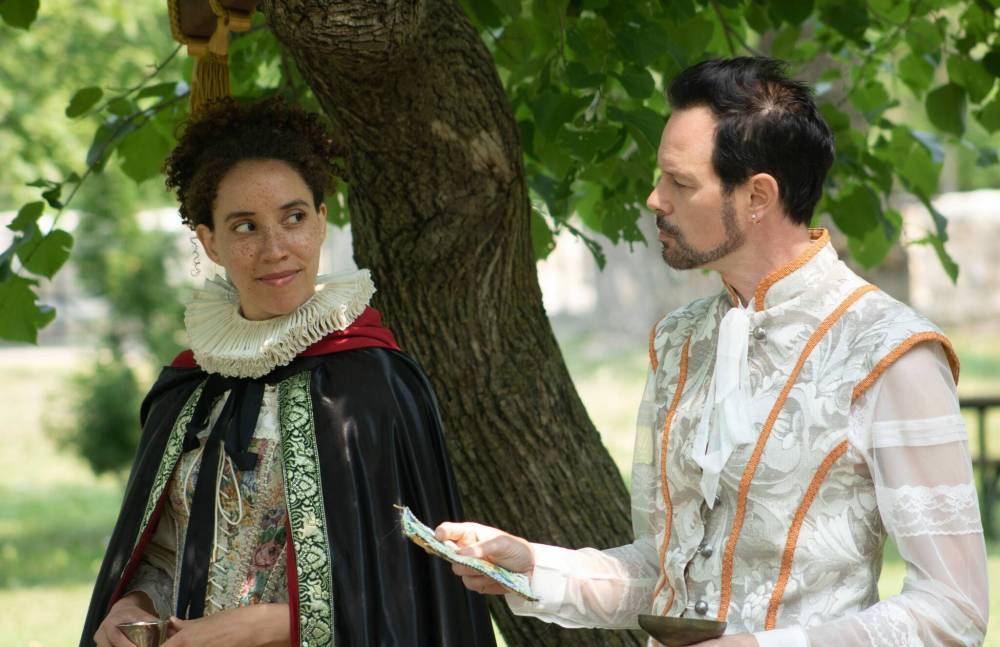Bard’s Dark Lady more than mistress, more than muse
Whip-smart two-hander fleshes out historical romance
Advertisement
Read this article for free:
or
Already have an account? Log in here »
To continue reading, please subscribe:
Monthly Digital Subscription
$0 for the first 4 weeks*
- Enjoy unlimited reading on winnipegfreepress.com
- Read the E-Edition, our digital replica newspaper
- Access News Break, our award-winning app
- Play interactive puzzles
*No charge for 4 weeks then price increases to the regular rate of $19.95 plus GST every four weeks. Offer available to new and qualified returning subscribers only. Cancel any time.
Monthly Digital Subscription
$4.99/week*
- Enjoy unlimited reading on winnipegfreepress.com
- Read the E-Edition, our digital replica newspaper
- Access News Break, our award-winning app
- Play interactive puzzles
*Billed as $19.95 plus GST every four weeks. Cancel any time.
To continue reading, please subscribe:
Add Free Press access to your Brandon Sun subscription for only an additional
$1 for the first 4 weeks*
*Your next subscription payment will increase by $1.00 and you will be charged $16.99 plus GST for four weeks. After four weeks, your payment will increase to $23.99 plus GST every four weeks.
Read unlimited articles for free today:
or
Already have an account? Log in here »
Hey there, time traveller!
This article was published 17/06/2023 (937 days ago), so information in it may no longer be current.
For more than 400 years, mystery has enshrouded the identity of Shakespeare’s “Dark Lady” as depicted in his sonnets, believed by many to be English poet-musician Emilia Bassano.
One of those believers Canadian powerhouse actor-playwright Jessica B. Hill, whose sophomore play The Dark Lady marked its world premiere by Shakespeare in the Ruins last week. Performed in the round on the leafy banks of La Salle River, the co-production with Saskatoon’s Shakespeare on the Saskatchewan — where the 75-minute (sans intermission) show moves next month — runs locally through July 2.
The Montreal-born Hill, now in her seventh season with the Stratford Festival, has garnered critical acclaim for her electrifying performances, including last year’s All’s Well that Ends Well.

Mike Thiessen / Winnipeg Free Press
Jessica B. Hill (left) and Eric Blais star in The Dark Lady.
Local theatre buffs will also remember her playwriting debut (another co-pro with SIR), the solo show Pandora, which premièred at Prairie Theatre Exchange in January.
Her latest offering, smartly directed by SIR’s Rodrigo Beilfuss, features Hill as the feisty Bassano, fighting to take her rightful place as an artist in heavily male-dominated Elizabethan society.
Well-known Winnipeg actor Eric Blais crafts the Bard as an all-too-human, often bumbling wordsmith, who point-blank tells his muse and presumed lover, “I think I need your mind.”
The briskly paced, mostly linear narrative unfolds as a series of short scenes in which the lovers’ relationship blossoms against a backdrop of drive and ambition, interlaced with highly effective monologues in which Bassano, raised in a family of Venetian Jews of Moroccan ancestry, bares her soul.
More of these more contemplative moments would have been welcome during Friday night’s performance, as we taste Bassano’s pride and pain of living as a self-determined feminist in a repressive society, where female writers were typically relegated to transcribing the Bible.
It would have also infused Hill’s fiery portrayal with greater vulnerability, creating effective counterpoint, while making her protagonist even more real.

Mike Thiessen / Winnipeg Free Press
Writer/actor Jessica B. Hill (left) as Emilia Bassano and Eric Blais as William Shakespeare in The Dark Lady.
Nevertheless, Hill’s spirited, snappy dialogue cracks like a whip throughout, delivered flawlessly by both actors and effectively straddling the worlds of contemporary vernacular — with a few F-bombs thrown in — and poetic odes.
Winnipeg guitarist and singer George Bajer-Koulack, appearing as Emilia’s cousin, Antonio Bassano, performs a sultry, “less-is-more” live score ranging from Villa-Lobos to Spanish flamenco riffs, with the latter underscoring the poet’s Mediterranean roots.
Brenda McLean’s period costume changes strategically reflect the passage of time. It’s strangely startling when an empowered Emilia demands to swap her skirt for Will’s pants, although gender-blind equality precisely the point of this play, and very moving when Bassano’s infant daughter slips away in death as a limp shawl, guided by Beilfuss’s sensitive direction.
Daina Leitold’s imaginative sets and props include heavily brocaded fabric swatches morphing into manuscript pages, on which Shakespeare pens his sonnets and Bassano her poetry.
The Dark Lady not only seeks to unearth truths behind our sacred cows, but delves into the power dynamics between romantic partners equally hungry for success. It’s chilling when Shakespeare turns his back on Bassano as his fame grows, and when he grieves the death of his son born in wedlock more than that of the daughter’s conceived through his love affair with Bassano in Hill’s play.

Mike Thiessen / Winnipeg Free Press
Jessica B. Hill (left) and Eric Blais star in The Dark Lady, a show Hill wrote about Emilia Bassano, a writer believed to be the “dark lady” Shakespeare wrote about in his sonnets.
At its heart, the play is a love story, but one that also asks potent questions about agency, and the perils and price artists pay for autonomy. One will never be sure just how much of a direct role Bassano — or others for that matter — played in Shakespeare’s canon. Ultimately, Hill seems to say, it doesn’t matter.
holly.harris@shaw.ca
Holly Harris writes about music for the Free Press Arts & Life department.
Our newsroom depends on a growing audience of readers to power our journalism. If you are not a paid reader, please consider becoming a subscriber.
Our newsroom depends on its audience of readers to power our journalism. Thank you for your support.



